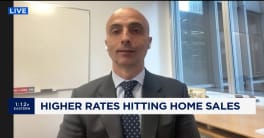IndyMac has announced that, effective yesterday, it is closing both its wholesale and retail production channel and will no longer accept any new mortgage loan submission or rate locks. It will also reduce its workforce to around 3,200 from the current level of 7,400. The bank will also, apparently, continue its other retail banking operations.
IndyMac Bankcorp, Inc is the holding company for IndyMac Bank, the 7th largest savings and loan and the 2nd largest independent mortgage lender in the nation. It claims to have financed the construction of over 70,000 new homes over the last five years but has consistently been listed among those financial institutions in serious trouble over the mortgage crises.
The stock had reached $.71 cents Monday after trading as high as 31.32 in the last year and was delisted from NASDAQ. There were no announcementS or news items on the Yahoo IndyMac website on Monday, but the company's own website made the following statement:
"Given the continued downward trend in home prices and a resulting increase in our forecasted credit losses and the related downward trend in the pricing of all mortgage related assets in the capital markets, especially mortgage-backed securities where we have experienced significant rating agency downgrades this quarter, we expect our loss for the second quarter to be larger than Q108, but it is difficult at this time to be more precise given the significant uncertainty surrounding accounting estimates, fair value accounting and other accounting matters.
"� We have been working closely with our federal banking regulators with respect to the actions that they and we must take to meet our mutual goal of keeping Indymac safe and sound through this crisis period. In that respect, based on information we have provided to our regulators, they have advised us that we are no longer "well capitalized", which we stated on May 12 was a possible scenario. Our regulators have also asked us to submit to them a new business plan for their review and approval, something on which we have been working with them for some time. We have agreed on the basic elements of the plan, and the regulators have directed us to begin executing on it. An important element of our plan is to improve our capital ratios. Without an external capital raise, the traditional way to improve safety and soundness is to sell assets and shrink the balance sheet, which in normal times generally has the effect of improving capital ratios and bolstering liquidity. Yet in this environment, where either there are no bids for most of IMB's mortgage loans and securities or the bid/ask spreads are abnormally wide, "fire-selling" assets would actually deplete capital further. As a result, the most realistic and cost-effective way to shrink both our balance sheet and our servicing rights asset (which, as discussed in previous communications, is up against the regulatory cap limit), is to curtail most new activity.
"As a result of the above, we have made the difficult decision, effective July 7, 2008, that we will no longer accept any new loan submissions or rate locks in our retail and wholesale forward mortgage lending channels, except for our servicing retention channel. We plan to honor all of our existing rate-locked loans and will continue to fund these loans in the coming weeks. While the managers and employees in these units have worked incredibly hard, these units are not currently profitable due to the continuing erosion of the housing and mortgage markets. At the same time, these operations take up significant balance sheet capacity and "feed" growth in the servicing asset, an asset we need to shrink given its size relative to our existing capital."
Unfortunately, the above actions will necessitate the reduction in our present workforce from approximately 7,200 to roughly 3,400 or so over the next couple of months, which should reduce our operating expenses by roughly 60%. We will retain about 1,100 employees in loan servicing in Kalamazoo and Austin; 350 in our servicing retention group in Irvine and Kansas City; 800 at Financial Freedom, primarily in Irvine, Sacramento, and Atlanta; 400 in our Southern California retail and web bank; 500 in portfolio management and administration, largely in Pasadena; and 250 in discontinued businesses. In building Indymac up from 4 employees in 1993 to its present size, we have had to retrench and then rebuild several times over the past 15 years, but clearly these are the largest and most difficult staff reductions we have ever had to make. If we had another alternative, we clearly would have chosen it, as we understand how painful these workforce reductions can be for the affected employees and their families. Given Indymac's current financial position and these significant layoffs, I strongly believe it is appropriate that I further materially reduce my own compensation. As a result, I have requested of Indymac's Board of Directors that they reduce my base salary by 50%.
The memo was signed by Michael W. Perry, CEO."







